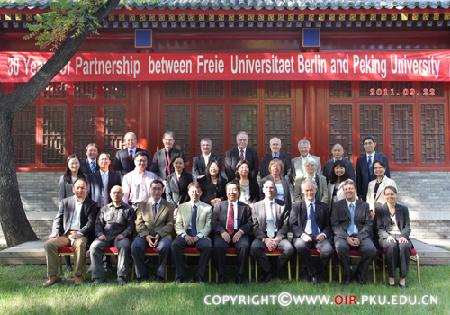News & Events | About PKU News | Contact | Site Search
Peking University, Sept. 29, 2011: Thirty years have passed since the start of cooperation between Peking University (PKU) and Freie Universitaet Berlin (FU Berlin) in 1981. From September 22 to 24, PKU held a series of events to celebrate the partnership. The opening ceremony was held on the afternoon of September 22 at Tan Siu Lin Center for International Studies.
During the ceremony, both universities did not only look back on their long and successful history of collaboration. They were also looking forward into the future: Earlier this year and on the occasion of a visit of PKU President Zhou Qifeng to Berlin, both partners signed an agreement to broaden and further their relations as a Strategic Partnership.
Wu Zhipan, PKU Executive Vice President extended warmest welcome to the visiting guests and congratulated on the successful holding of the celebrating events. He reviewed the collaboration of PKU and FU Berlin in past 30 years. The cooperation agreement between PKU and FU Berlin was signed in 1981, which was the first Sino-German agreement of its kind signed after the beginning of the opening up policy in China. "I hope that both universities can share the academic achievements, strengthen the communication and build a valid collaboration system to enhance our cooperation," said Wu.
Professor Peter-André Alt, the President of FU Berlin, said in his speech that though he didn't witness the progress of the 30 years' cooperation in person, he hoped that he could make his own contribution by relaying and promoting the culture exchange between China and Germany. "We are trying hard to promote the cooperation in many aspects, such as the exchange of teachers and students, establishing scholarship and enhancing scientific research." In 2006, the first Confucius institute in Germany was set up under the joint efforts of PKU and FU Berlin. Earlier this year in June, presidents from two universities signed an agreement to broaden their relations as strategic partnership, through which they added several interdisciplinary education and research programs and worked out collaborative training schemes for students covering students of all grades, another brand-new start. He hoped that both universities could make new progress in cooperation based on a good friendship.

Group picture in front of Tan Siu Lin Center for International Studies
After the opening ceremony, the delegation of FU Berlin took part in forums, seminars and touring in PKU for two days, and along the way strengthened the friendship by reviewing the past.
Extended Reading
Freie Universitaet Berlin was founded on December 4, 1948. It is one of the nine German higher education institutions to have been successful in all three lines of funding in the Excellence Initiative jointly sponsored by the German federal government and the governments of the federal states in 2007. All nine universities received funding for their future concepts. The future concept of Freie Universitaet is based on three key strategic centers: the Center for Cluster Development, which focuses on research planning; the Center for International Cooperation; and the Dahlem Research School, which supports next-generation academic talent. To popularize Chinese culture and language, Freie Universitaet Berlin together with Peking University set up the first Confucius institute in Germany and began recruitment in 2006.
The German Studies Center of Peking University
The German Studies Center of Peking University is an interdisciplinary research and educational institution. Faculties from different departments of humanities and social sciences of the university get together being engaged in research and educating students with professional knowledge and knowledge of German society and culture. The German Studies Center has wide connections and close ties with many universities and research institutions in Germany and China. Freie Universitaet Berlin is the most important partner of the center in Germany. The German Studies Center provides a master's program "German Culture and Its Society" to bring up young people theoretically and practically.
The core work of the center is to do an interdisciplinary research and discussion on Germany today mainly from the perspective of comparison between Germany and China, and to cultivate specialists in Germany-related issues. The German Studies Center provides an interdisciplinary research program of “study on Germany” for Master’s students, in which up to 20 students can spend the second school year in Germany. Furthermore, the center is also an important place for all kinds of Germany-related events.
Written by: Chen Meng
Edited by: Chen Long
Source: Office of International Relations, PKU